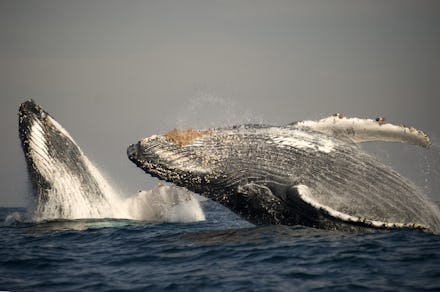Whales might save us from climate devastation

There are a lot of things to love about whales. They're excessively large which makes them fascinating to look at and, for the most part, are gentle to interact with. If that isn't enough, new research suggests that whales may help prevent climate catastrophe, and economists say it's skyrocketed their worth.
In an article published in Finance & Development, a trade publication, researchers at the International Monetary Fund (IMF) claimed that whales may be "nature's solution to climate change". You might be wondering what all the fuss is about. Whales are great, but they're not magic, right? Turns out whales are key because they absorb a ton of climate-heating carbon over their lifetimes.
Whales do this in a few ways. First, great whales, which includes those like the baleen and sperm whales, capture carbon in their bodies. According to National Geographic, you can think of them as like giant, swimming trees.
And, like pretty much every other animal, whales poop. They do this by coming up to the surface and expelling what Vice fondly nicknamed "poo-namis". It might sound ridiculous but whale poop nurtures tiny organisms called phytoplankton, which end up producing half the oxygen in the atmosphere while also pulling carbon out of the air.
A whale's benefit extends past its life, too. Dead whales sink to the bottom of the ocean. The carbon that a whale absorbs over its lifetime ends up sinking, too, and gets removed from the atmosphere for centuries.
“We have to agree whales are an international public good,” Ralph Chami, the lead author of the IMF’s study, told National Geographic. Because of the role that the average great whales could play in preventing climate catastrophe, researchers say that makes them worth about $2 million each — and that's a conservative estimate.
Today, there are about 1.3 million whales in the ocean. With all this in mind, it may be worth allowing whales to return to their pre-whaling numbers of about 4 to 5 million. Allowing them to do so would be the equivalent of planting four Amazon rainforests, researchers argued, and it's something they referred to as "earth-tech" strategy.
"Whales are not a human solution — these great creatures having inherent value of their own and the right to live — but this new mindset recognizes and values their integral place in a sustainable ocean and planet," the researchers wrote. "Healthy whale populations imply healthy marine life including fish, seabirds, and an overall vibrant system that recycles nutrients between oceans and land, improving life in both places."
There is a lot more research to be done in order to determine exactly how much carbon whales capture. The analysis hasn't been published in a peer reviewed scientific paper yet, either.
But, humans increasingly messing with nature is part of why there's a climate crisis to start. The demands of capitalism have led to massive deforestation, fracking, and more. Humans need to change our own behavior, but perhaps part of the solution also needs to be stepping back and allowing whales and nature to do their thing.